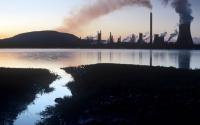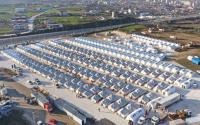by Jessica McCallin; The Sunday Herald; October 28, 2002
Israil infrastructure minister Effi Eitam last week banned Palestinians from drilling for water in the West Bank and put a freeze on the issue of permits for future drillings.
The decision will have a severe effect on Palestinian agriculture, which relies mainly on water drilled from the ground, and will make it difficult for some villagers to access drinking water. Agriculture is already reeling from the amount of land confiscated or destroyed by Israel and a recent ban on Palestinians harvesting their olive crop.
Many villages, some 30% of which have never been connected to the water network, usually have to take drinking water from ground resources -- either because they cannot afford to buy it from tankers, or because, due to Israel's policy of closure, water tankers cannot get into the villages.
It also adds insult to an already discriminatory injury. Israelis get between between five and seven times as much water as Palestinians, and they get priority access. When supplies in the semi-arid region are low, as during the summer months, the Israeli water company, Mekorot, closes the valves which supply Palestinian towns and villages so that Israeli supplies will not be affected.
In practice this means that Israeli settlers, living in illegal settlements on the West Bank, get their swimming pools topped up and their lawns watered while Palestinians living in villages next to them -- on whose land the settlements have usually been built -- can go without enough water for drinking and cooking.
Eitam said he was imposing the drilling ban because the Palestinian Authority (PA) is running a 'water intifada' against Israel by failing to build water purification facilities in the hope of polluting Israel's ground water. He added that the PA was 'enabling Palestinians, mainly in Areas A and B [under Palestinian and Israeli security control respectively, according to the Oslo peace accords], to carry out unauthorised drillings in order to steal water from the state of Israel'.
Palestinians say this argument is illogical and confused. The PA has effectively been destroyed by the government of which Effi Eitam is a member. In addition, money raised from Palestinians in the form of taxes, which should go to the PA, is being withheld by Israel. It is not clear how the PA is supposed to build water purification facilities under these conditions.
Why Eitam should think the Palestinians would want to pollute the ground-water resources when they too drink from them is also unclear. More importantly, the charge that Palestinians are trying to steal water from Israel and the settlements is, they say, verging on the ridiculous.
Under international law the West Bank's water resources -- the Mountain Aquifer and the Jordan river basin -- are joint resources to be shared by Israel and Palestine on the principles of equitable and reasonable use.
However, Yehezkel Lein -- a researcher with B'Tselem, the Israel centre for human rights in the Occupied Territories -- says that since occupying the West Bank in 1967, Israel has exploited its water resources, which it had no access to before the war, to benefit Israel and its illegal settlements over the Palestinians.
Once Israel had conquered the West Bank, he says, it immediately confiscated almost all the wells, banned the drilling of new ones and put quotas on how much water could be drawn from existing ones. The amount of water allocated to Palestinians was capped at 1967 levels and has remained unchanged des pite the growth in the Palestinian population.
Israel now uses 79% of the Mountain Aquifer and all of the Jordan river basin, bar a small quantity that it sells to Palestinians in the Gaza strip. The result, as the discrepancy in water consumption shows, is neither equitable nor reasonable.
Many commentators say Israel invaded and occupied the West Bank and the water-rich Syrian Golan Heights in 1967 precisely because it wanted access to the water, and add that this is why Israel is so reluctant to give back those territories in a land-for-peace deal. Jad Issac, director of the Applied Research Institute of Jerusalem, says more than half of the water Israel uses comes from the territories occupied in 1967.
More recently, Israel has threat ened to bomb pumping stations in southern Lebanon if the Lebanese continue with plans to divert parts of the Wazzani river, which originates in Lebanese territory. Oil may make the headlines in the Middle East, but water is the resource that Middle Eastern countries fight over most of the time.






